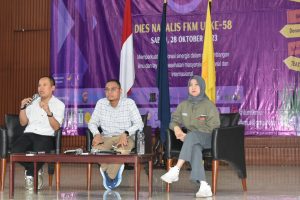
An emergency is an unexpected or unplanned event or incident that results in harm to humans; interfere with smooth operations; or causes physical or environmental damage, which must be prevented and dealt with quickly and appropriately so that the consequences can be minimized as much as possible (pakki.org). An emergency is an unwanted situation anywhere. However, how to minimize the impact of an emergency or disaster is important to know.
Starting from the importance of awareness of disaster emergency response preparedness, the Alumni Association (ILUNI) of the Faculty of Public Health (FPH) Universitas Indonesia (UI) held an Emergency Response (ER) Challenge Talkshow as one of a series of peak events for the 58th Anniversary of FPH UI on Saturday, October 28, 2023, at UI Hall.
Emergency response preparedness is a series of activities carried out to anticipate emergency conditions through organization and appropriate and effective steps. Emergencies and crises can have significant impacts on workplaces, operating facilities, and company assets. “Therefore, emergency and crisis management (Emergency Response & Crisis Management – ERCM) needs to be prepared carefully,” said Prof. dra. Fatma Lestari, M.Sc., Ph.D., Professor at the Department of Occupational Safety and Health (K3) FPH UI, in her sharing about Companies in Disaster Regulations and Planning, Response from Chaos to Control: Corporate Emergency Response to Major Disasters. Apart from talking about ERCM, Prof. Fatma also shared information about disaster risk management, occupational safety, and health management systems, as well as regulations and supporting tools.
Furthermore, PT Vale Indonesia’s Director of Strategic and Corporate Affairs, Budiawansyah, who is also a Doctoral Program student at FPH UI, shared about Emergency and Crisis Management, Towards Resilient and Sustainable Business. “To move towards sustainable mining practices, a resilient organization is needed, including when facing crisis conditions. “Mitigation before and during crisis conditions will be beneficial for organizations to continue to increase productivity during the crisis,” said Budiawansyah. According to him, in managing a crisis there are 4 (four) main things that must be considered, namely understanding the business, understanding the business first for whatever type of disaster or crisis that strikes, secondly safety of life, paying attention to safety, thirdly organizational commitment, and intelligent information, to Know the next steps the organization should take.
Emergency response preparedness must prioritize community protection, then property and assets. Emergency response must attempt to contain, control, or end the emergency. (wrk)
